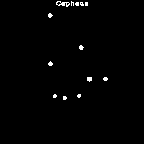A Brief History of the Constellations
Most of the constellations, as we know them, represent figures defined by the ancient Greeks. They inherited an even earlier astronomical tradition from the Mesopotamian civilizations (Sumeria & Babylon). This tradition is all well and good, if you are an ancient Greek, but it excludes the constellations as defined by the Chinese, Norse, Arabs, Egyptians, and Meso-Americans. After the fall of the Roman empire, and before the ascendancy of European civilizations, the Arabs continued the study of astronomy. Because of this, many of the brighter stars have Arabic names. As European explorers traveled the Earth, they observed the previously unseen stars of the southern hemisphere. Astronomers of those times defined the “new” constellations after their technological devices, but they also continued the tradition of Greek mythology and animals. Some definitions of constellations were inconsistent, or mutually exclusive. Even now, the star Alpheratz belongs to both constellations Andromeda and Pegasus. In 1930, the International Astronomical Union defined the 88 constellations as known today, and made them regions in the sky, rather than asterisms. They eliminated both quaint (Aeronavigus Pnuematica) and well-established (Argo Navis) constellations. The large, sprawling Argo Navis, representing the Argonaut’s ship, was split into several constellations. They used Latin names, and assigned 3-letter abbreviations to each constellation.
But this is history. The ET’s have arrived, and we are creating new asterisms to define our universal human heritage.
